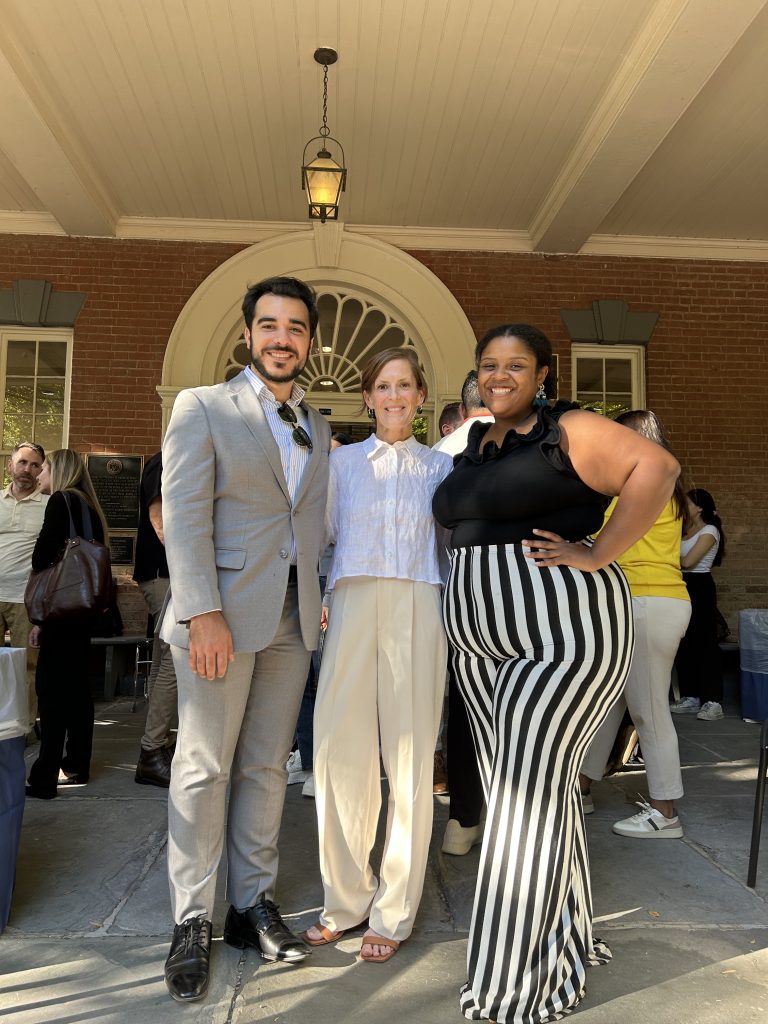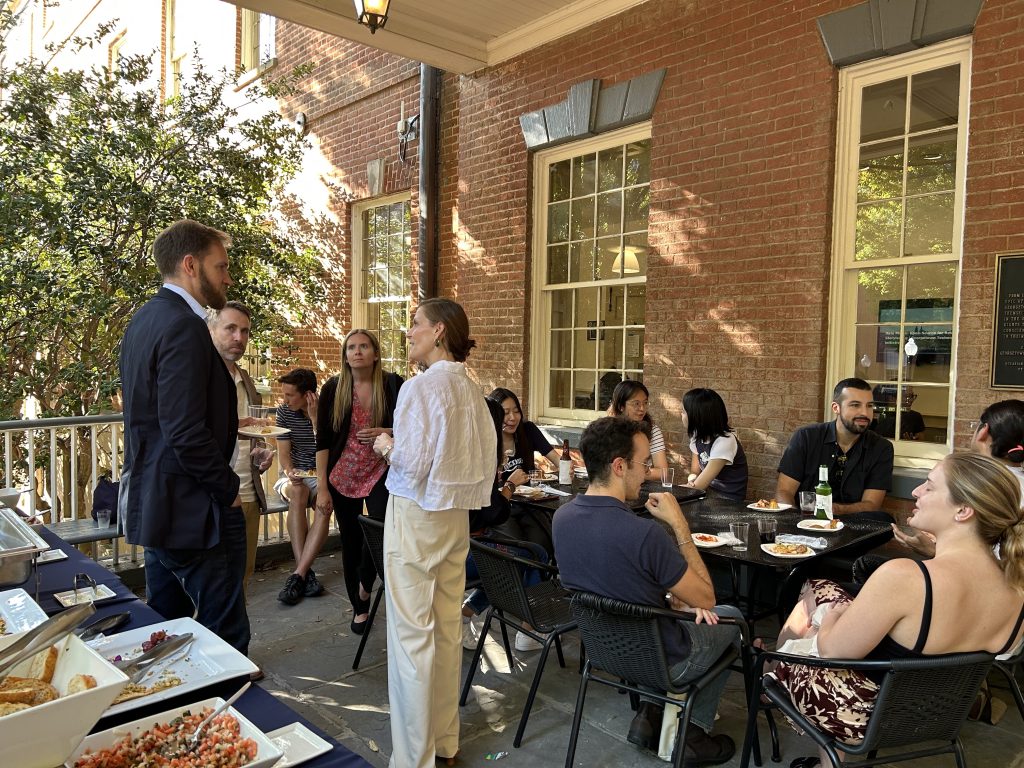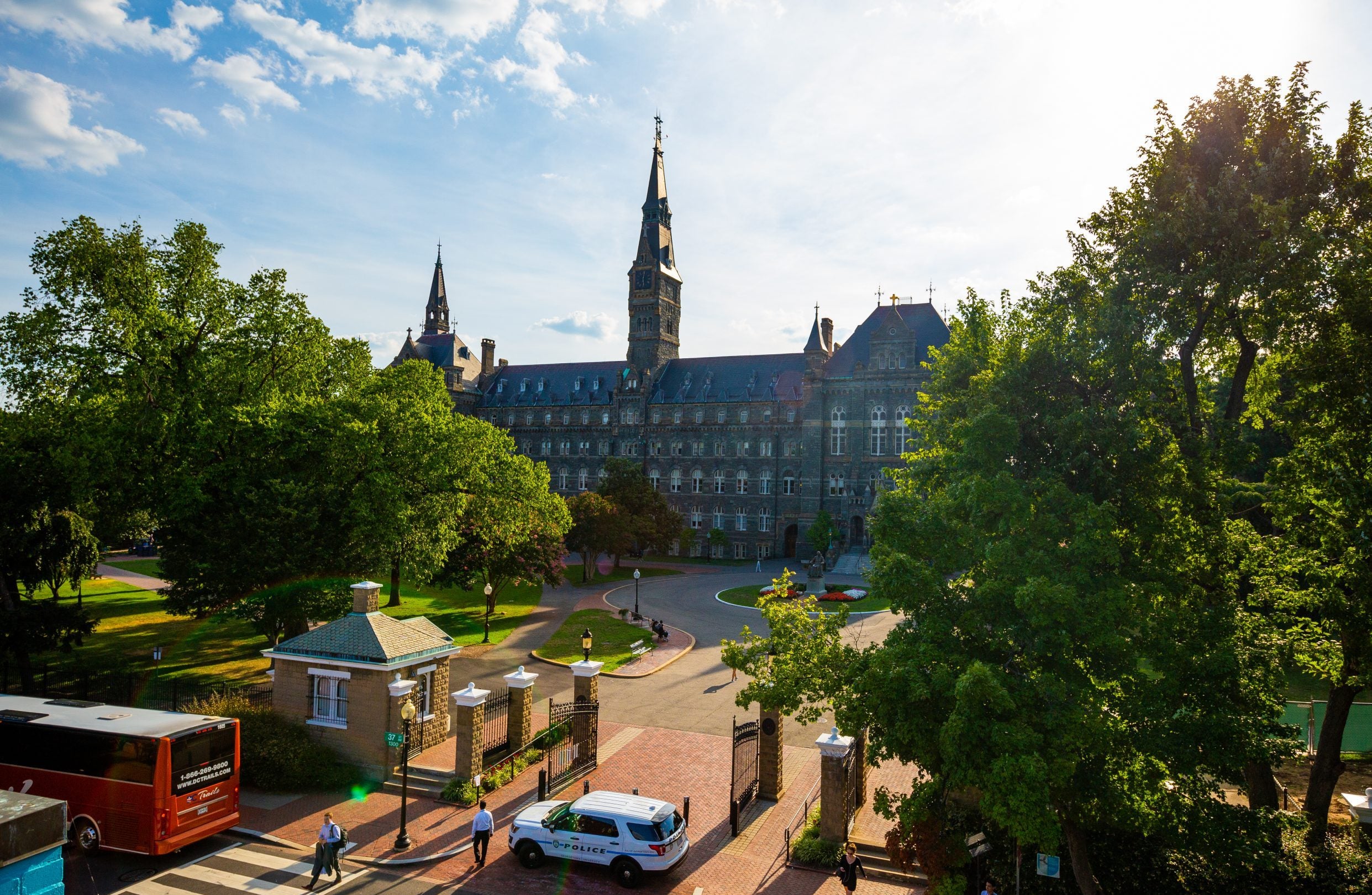The future of technology and its threats to education, elections and policing
Over the next year, Tech & Public Policy Scholars at Georgetown University’s McCourt School of Public Policy will examine and advance human-centered policy solutions to challenges posed by current and future technologies.
Tech & Public Policy (TPP) Scholars Maitreyi Natarajan (MPP/MBA’24), Kevyanna Rawls (MPP’24), Talia Stringfellow (MPP’25), Sanha Tahir (MS-DSPP’24) and Santiago Vidal Calvo (MPP’25) were matched with leading Georgetown faculty and researchers to examine and advance human-centered policy solutions to challenges posed by current and future technologies.
In May 2023, the McCourt School students joined the inaugural class of Tech & Public Policy Scholars , each receiving a partial-tuition scholarship, a paid research assistantship and access to special events, discussions and mentorship opportunities through the McCourt School’s Tech & Public Policy program.

Tracking threats against election officials
Santiago Vidal Calvo (MPP’25) is working with Ioannis Ziogas , assistant teaching professor and assistant research professor at the McCourt School’s Massive Data Institute on a project titled “Tracking Threats Against Election Officials.” In collaboration with Dr. Lia Merivaki (Mississippi State University) and Dr. Colleen Sinclair (Louisiana State University), Ziogas and Vidal Calvo will compile a database of more than 60 media outlets, primarily online newspapers, to analyze the threats made to election officials and subsequent charges brought by the U.S. Department of Justice. The database will include information on election officials and perpetrators, methods for delivering threats, party affiliation and specific words or threats, and also contribute to a larger project on election protection and threats to the election system made by media outlets.
“I come from Venezuela, where technology has been used to enhance corruption, control populations and stabilize a dictatorship accredited with thousands of human rights violations,” said Vidal Calvo. “I want to study the effects of authoritarian government restrictions on the web and their role in controlling and suppressing freedom of speech.”
The spread of misinformation
In partnership with Assistant Professor and TPP Grantee Tiago Ventura , Maitreyi Natarajan (MPP/MBA’24) is studying the causal effect of exposure to misinformation on beliefs and political attitudes. Ventura and Natarajan will conduct a study, randomly assigning users to a multimedia deactivation of WhatsApp, in which participants turn off their automatic download of any multimedia (image, video or audio) on WhatsApp and are incentivized not to access any multimedia content during the weeks leading up to India’s 2024 elections. Ventura and Natarajan hope to identify any changes in political activity among WhatsApp users who were unable to download and subsequently share multimedia on the platform.
“Prior to pursuing my dual degree at Georgetown University, I worked in technology and in predictive algorithms in India,” said Natarajan. “I have experience in the field and understand the need for regulation in tech, especially with the rapid growth of AI.”

Carceral ideology in schools
Kevyanna Rawls (MPP’24) is working with Assistant Professor NaLette Brodnax , an education policy expert , to examine the extent to which carceral ideology — an orientation toward punitive practices — acts as a structural barrier to reducing persistent educational inequalities for Black students. Brodnax and Rawls will use advanced text analytics techniques in public school handbooks to determine the relationship between school environment — everyday routines, practices and policies — that influence racialized disparities in disciplinary and academic outcomes.
“For most of my life, I have lived in communities where discrimination and prejudices against communities of color have been prevalent,” said Rawls. “These conditions have motivated me to understand the ‘why?’ and utilize my opportunities to draw attention to these disparities.”
A data pipeline to study school boards and K-12 inequality
In partnership with Assistant Professor and TPP Grantee Rebecca A. Johnson , Talia Stringfellow (MPP’25) will support the development and dissemination of DistrictView, a data pipeline that aims to shine a spotlight on the on-the-ground discussions that lie behind U.S. K-12 inequality. Collaborating with a team of researchers that includes Soubhik Barara , a research methodologist at NORC, Tyler Simko , a Ph.D. student at Harvard University, Hannah Waight , a postdoctoral fellow at NYU’s Center for Social Media and Politics, and MDI Scholars Maggie Sullivan and Corrina Calanoc. The research team is expanding upon Tyler and Soubhik’s work building LocalView, a database of local government meetings, including nearly 125,000 meeting videos and transcripts from over 1,500 school districts spanning several school years, reflecting a rise in meeting transparency due to virtual pivots during the COVID-19 pandemic.
Stringfellow will support the refinement of the database and focus on the dissemination of the data and actionable findings to both academic audiences who study K-12 inequality and civil society actors who intervene to reduce disparities. The research team aims to submit a data pipeline-focused academic paper for peer review by the end of fall 2023, a substantive paper studying polarization in discussions by summer 2024, and host a “Datathon” convening during the 2024-2025 academic year where researchers and practitioners will brainstorm action-oriented uses of the data.
Civil citations
Sanha Tahir (MS-DSPP’24) is working with Assistant Professors NaLette Brodnax and Andrea Headley to identify patterns of racism in NYPD police officers’ citation actions. They will use Google Optical Character Recognition, powered by Google Computer Vision AI, to extract data from police files to analyze citations issued to anyone who has committed a criminal act and determine whether certain officers issue more citations to people of color.
To stay up to date on events and news from the McCourt School’s Tech & Public Policy program, sign up for our newsletter here.
